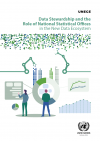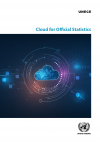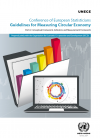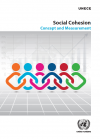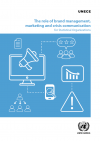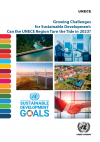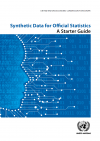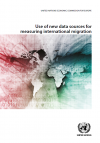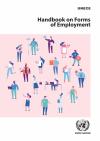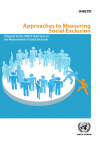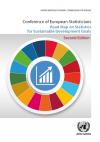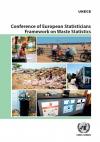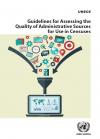Statistics Publications
Displaying Results 1 - 20 of 232
- English
This addendum to the Road Map provides conceptual guidance on issues related to SDG indicator availability and practical guidance on how to assess indicator availability. There are two major questions that this addendum tries to answer:
When is an SDG indicator considered available and what
- English
Indicators are vital tools in environmental and economic policymaking. They simplify complex issues into manageable metrics, guiding decision-making, assessing performance and ensuring accountability. By providing a structured approach, indicators help set objectives, monitor progress and evaluate
- English
The rapidly evolving landscape of data production and sharing is an opportunity for national statistical offices to reconsider their position in the national data ecosystem and take on a broader role as a provider of data services. A concept often used in association with this changing role is data
- English
The demand for timely, relevant, and trustworthy statistical insight continues to grow at an unrelenting rate. Similarly, the digital age continues to provide quantities of data which require additional processing, storage, analytical and dissemination capability.
The development of Cloud computing
- Español
La demanda de información estadística oportuna, pertinente y fiable sigue creciendo a un ritmo imparable. Del mismo modo, la era digital sigue proporcionando cantidades de datos que requieren una mayor capacidad de procesamiento, almacenamiento, análisis y difusión.
El desarrollo de los servicios
- English
In the past two decades, many countries and the European Union have been orienting their waste and materials management policies towards preventive and integrated approaches, with emphasis on the life-cycle and supply chains of materials and products. Policy initiatives aimed at establishing a
- English
ONLINE PUBLICATION
This publication provides the 2024 progress assessment on the Sustainable Development Goals (SDGs) in the region of the United Nations Economic Commission for Europe (UNECE), based on the data available in the United Nations Global SDG
- English
Social cohesion, broadly speaking, is the ‘glue’ that binds society together.
Societies with higher levels of social cohesion are healthier, more resilient to external shocks, and experience greater economic growth. An understanding of social cohesion helps us make sense of a wide range of topics
- English
In the age of the information deluge, National Statistical Offices (NSOs) and International Statistical Organizations serve as vital sources of independent, reliable, and trusted Official Statistics. Amidst the proliferation of alternative data sources and global misinformation, these organizations
- English
ONLINE PUBLICATION
This publication provides a progress assessment on the Sustainable Development Goals (SDGs) in the region of the United Nations Economic Commission for Europe (UNECE), based on the data available in the United Nations Global SDG
- English
Producers of official statistics face a complicated task in managing users’ access to the data they collect, as they must maintain the confidentiality of the individuals or businesses who have provided their data to them, while being under pressure to release ever more detailed datasets in order to
- English
Migration and other forms of cross-border mobility are issues of high policy importance. Demands for statistics in these areas have further increased in light of the 2030 Agenda for Sustainable Development and the 2018 Global Compact for Safe, Orderly and Regular Migration. The statistical
- English
The 1989 United Nations Convention on the Rights of the Child obliges parties to ensure all children have a fair chance in life. The development of national and international policies that provide all children and youth the best possible start in life and support a successful transition to
- English
In recent years, many countries have witnessed the emergence and growth of new forms of employment, driven by economic changes, the adoption of new business models, technological advancement, and continuing digitalization. New ways of organising work and production have been accelerated by the
- English
Social exclusion is measured and defined in a range of ways. While many countries measure some aspects of social exclusion, few surveys or statistical methods are specifically designed for this. This publication presents approaches and practices in measuring social exclusion.
The introductory
- English
ONLINE PUBLICATION
This publication provides a progress assessment on the Sustainable Development Goals (SDGs) in the region of the United Nations Economic Commission for Europe (UNECE), based on the data available in the United Nations Global SDG
- English
Machine Learning holds a great potential for statistical organisations. It can make the production of statistics more efficient by automating certain processes or assisting humans to carry out the processes. It also allows statistical organisations to use new types of data such as social media data
- English
The second edition of the Road Map on Statistics for SDGs aims to provide guidance to members of national statistical systems and other stakeholders on how to best navigate the complex task of measuring the achievement of the goals and targets of the 2030 Agenda. By doing so, it strives to
- English
Official waste statistics have been produced for more than 40 years. They were initially developed to monitor and manage threats to human health and the environment. More recently, information needs have shifted toward realizing the economic value of waste, particularly in the context of the “
- English
The use of administrative data for censuses continues to increase across the countries of the UNECE region and beyond. Administrative sources are used in a wide variety of ways, from supporting operations in a traditional census all the way to fully register-based censuses. It is important that


